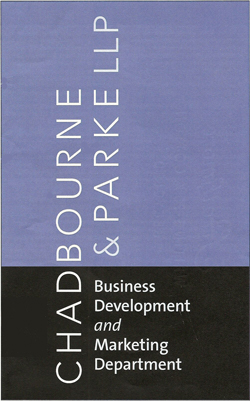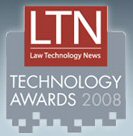 In my opinion, the election of Barack Obama as President brings all sorts of good news for the legal profession.
In my opinion, the election of Barack Obama as President brings all sorts of good news for the legal profession.
Regulatory law. After 8 years of minimal regulation of business (except for crackdowns on illegal aliens), lawyers with a regulatory practice will see much more activity in their practices. If your clients include banks, private-equity funds or large oil companies, they will be targets of the new administration and will need plenty of counsel from you.
We will once again see trials, which had nearly disappeared from America's courts. This is good news for defense and plaintiff lawyers alike. Tort reform has been so effective that there are hardly any trials any more. The National Center for State Courts reported that the number of jury trials dropped 44% in the last 10 years. The movement has killed many areas of personal injury practice by limiting damages and making it difficult to file a cause of action to begin with. But the Republican party and its corporate support base for tort reform is shattered. Meanwhile the American Association for Justice (formerly ATLA) will actively work to make it easier to bring
- Product liability cases
- Class actions against pharmacy companies
- Limit companies' use of federal regulations as a shield from litigation under state law
- Eliminate mandatory-arbitration clauses in consumer contracts.
Health Insurance Companies. If your firm represents insurance companies that write health care coverage, you can expect to advise them on a raft of coming regulations. Get ready if any of the following are your clients: UnitedHealth Group Incorporated, Aetna Inc., WellPoint, Inc., CIGNA Corporation, Kaiser Permanente, Humana Inc., Luxottica Group S.p.A., Medco Health Solutions, Inc., HealthSpring, Inc. and Genworth Financial, Inc.
Green Clients. You're in good shape if you represent companies that reduce green-house gases, supply alternative forms of energy like wind-power, make hybrid vehicles or increase renewable energy resources. Sure, their stock prices are down right now, along with the rest of the S&P 500. But the new administration will be creating tax incentives and possible new funding your clients will want to know about from you.
Real Estate. Residential real estate closings are fewer than ever, it seems. But I predict that the new administration will force banks getting a piece of the $700 bailout to make mortgage loans, and not use the money to acquire competitors. Further, he's proposed a 90-day moratorium on home foreclosures, affecting 6.5 million households. Banks dump foreclosed homes on the market, depressing prices. This discourages people from selling their homes. An increase in mortgage loans and break from the foreclosure flood can ramp up real estate closings.
Meanwhile, there is a boom in litigation in subprime loan/credit crisis litigation that includes:
- For big firms, filing securities class actions, shareholder derivative suits, and ERISA lawsuits against failed lenders and investment banks. The plaintiffs include borrowers, shareholders, investors, issuers & underwriters, retirement plan participants. Defendants include lenders, issuers, underwriters, rating agencies, accounting and law firms, bond issuers and hedge funds.
- For smaller firms, representing homeowners renegotiate terms or come up with "short sales" with their lenders.
- Suits on behalf of developers, investors and contracts against banks that cut off their credit before the real estate projects were completed.
- Advising home owners on J.P. Morgan's new offer of option adjustable-rate mortgages, which allow homeowners to make a minimum payment, as credit card companies do.
Labor Law. Union members dwindled to only 12% percent of employed wage and salary workers, according to the Bureau of Labor Statistics. But the new administration is expected to shift the balance of power in favor or unions and against employers. In his speech to the AFL-CIO, Obama said, "We're ready to play offense for organized labor. It's time we had a President who didn't choke saying the word "union." A President who knows it's the Department of Labor and not the Department of Management. And a President who strengthens our unions by letting them do what they do best - organize our workers." More union members mean more contracts for labor lawyers to negotiate and write.
Government Contracts. There will continue to be work in this practice, but it's less likely to be for defense contractors as the U.S. withdraws from Iraq. I predict that the new contracts to be awarded will be for green technology, alternative energy producers, Internet projects that support network neutrality, expansion of broadband access, and construction of roads, highways and bridges.
Bankruptcy. According to Bruce Zirinsky, Cadwalader, Wickersham & Taft, some of the amendments to the Bankruptcy Abuse Prevention and Consumer Protection Act (BAPCPA) of 2005 will be repealed, especially the ones that made Chapter 11 less of a safety net for companies. It has become in vogue in recent years to have quickie Chapter 11s, according to Zirinsky. But as more companies are forced into Chapter 11, there will be more of a sentiment that bankruptcy protections are more important. BAPCPA took out the rights of Chapter 7, making it harder for individuals to hold onto nonexempt assets. "But as we see more and more mortgage foreclosures, I think people will try to reform this law," he said.
In sum, Obama's rising sun logo is the light at the end of the tunnel for law firms.
 According to Hildebrandt's The Anatomy of Law Firm Failures, failed law firms, like Thelen and Heller Erhman, have three things in common:
According to Hildebrandt's The Anatomy of Law Firm Failures, failed law firms, like Thelen and Heller Erhman, have three things in common:  Yolanda Young has launched the blog
Yolanda Young has launched the blog .jpg) It's crunch time in both the legal business and the economy at large. In the newest issue of
It's crunch time in both the legal business and the economy at large. In the newest issue of 
 The 2008
The 2008  Nothing is more frustrating when a an MBA or JD who has toiled in the firm's marketing vineyards, striven mightily to generate new business for the firm, and vainly proposed great ideas like CRM, client surveys and competitive intelligence only to have them ignored -- than it is to have a lawyer at the firm ask:
Nothing is more frustrating when a an MBA or JD who has toiled in the firm's marketing vineyards, striven mightily to generate new business for the firm, and vainly proposed great ideas like CRM, client surveys and competitive intelligence only to have them ignored -- than it is to have a lawyer at the firm ask: The one-sheet, distributed firmwide, also describes 19 additional professionals in New York, London, Moscow and Warsaw:
The one-sheet, distributed firmwide, also describes 19 additional professionals in New York, London, Moscow and Warsaw: 
 From the
From the  I just picked this up from a public relations agency:
I just picked this up from a public relations agency: Several lawyers lawyer made the list in today's "
Several lawyers lawyer made the list in today's " Christine Lagarde, Finance Minister of France. Before becoming trade minister in 2005, she spent five years in Chicago as chairwoman of international law firm Baker & McKenzie.
Christine Lagarde, Finance Minister of France. Before becoming trade minister in 2005, she spent five years in Chicago as chairwoman of international law firm Baker & McKenzie. Pamela Daley, Senior Vice President, Corporate Business Development at General Electric. The Princeton University graduate honed teaching skills as an adjunct professor at University of Pennsylvania Law School, where she graduated top of her class and edited the law review. A tax lawyer by training, she was a partner at the Philadelphia office of Morgan, Lewis & Bockius in 1989 when GE attorneys recruited her. A year later, she was GE's top mergers-and-acquisitions lawyer.
Pamela Daley, Senior Vice President, Corporate Business Development at General Electric. The Princeton University graduate honed teaching skills as an adjunct professor at University of Pennsylvania Law School, where she graduated top of her class and edited the law review. A tax lawyer by training, she was a partner at the Philadelphia office of Morgan, Lewis & Bockius in 1989 when GE attorneys recruited her. A year later, she was GE's top mergers-and-acquisitions lawyer. Barbara Desoer, President, Mortgage, Home Equity & Insurance Services, Bank of America. She's not a lawyer, but she negotiated a settlement with 14 state attorneys general targeting Countrywide's lending practices. The $8.4 billion legal agreement seeks to modify loans by reducing principal owed or lowering interest rates for 400,000 subprime and adjustable-rate borrowers.
Barbara Desoer, President, Mortgage, Home Equity & Insurance Services, Bank of America. She's not a lawyer, but she negotiated a settlement with 14 state attorneys general targeting Countrywide's lending practices. The $8.4 billion legal agreement seeks to modify loans by reducing principal owed or lowering interest rates for 400,000 subprime and adjustable-rate borrowers. Nicole Seligman, Executive Vice President and General Counsel, Sony. Not a lawyer, but she oversees legal, compliance and internal-audit issues across the Japanese company's broad range of businesses.
Nicole Seligman, Executive Vice President and General Counsel, Sony. Not a lawyer, but she oversees legal, compliance and internal-audit issues across the Japanese company's broad range of businesses. The
The  According to lawyer and marketer
According to lawyer and marketer  I asked my networks the following question: "I’m advising a law firm that is spending a ton of money on TV advertising (they do some plaintiff PI work, but also have a billable-hour business practice.) Which is a better marketing medium: TV or the Web? Give me your opinion."
I asked my networks the following question: "I’m advising a law firm that is spending a ton of money on TV advertising (they do some plaintiff PI work, but also have a billable-hour business practice.) Which is a better marketing medium: TV or the Web? Give me your opinion." In my opinion, the election of Barack Obama as President brings all sorts of good news for the legal profession.
In my opinion, the election of Barack Obama as President brings all sorts of good news for the legal profession.  The profession has demonstrated that that article "
The profession has demonstrated that that article "


